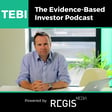Become a Creator today!Start creating today - Share your story with the world!
Start for free
00:00:00
00:00:01

Ep 40 Meir Statman on surviving the bear market
Robin Powell's guest n this episode we’re discussing the bear market with the world-renowned behavioural scientist Meir Statman. He’s the Glenn Klimek Professor of Finance at Santa Clara University. What happens in the minds of investors when markets fall? And how can we stop ourselves acting irrationally? Professor Statman has some fascinating insights on those questions and more. And, you may be pleased to hear, even he is not immune to feeling anxious when stock prices head south. He also has some very interesting advice for young people tempted to invest in cryptocurrencies.
Transcript
Introduction to TEBI Podcast
00:00:04
Speaker
Hello and welcome to the TEBI podcast from The Evidence-Based Investor. I'm Robin Powell. This podcast is brought to you by Regis Media, which provides financial advice and planning firms with high-quality video content.
Understanding Bear Markets
00:00:20
Speaker
In this episode, we're discussing the bear market with the world-renowned behavioral finance expert, Maya Statman. He's the Glenn Klimick Professor of Finance at Santa Clara University.
00:00:34
Speaker
So what happens in the minds of investors when markets fall? And how can we stop ourselves acting irrationally? Professor Stapman has some fascinating insights on those questions and more.
00:00:49
Speaker
And you may be pleased to hear even he is not immune to feeling anxious when stock prices head south. He also has some very interesting advice for young people tempted to invest in cryptocurrencies. So enjoy my interview with Maya Stapman. Maya, it's very good to speak to you. Thank you so much for your time.
00:01:20
Speaker
Oh, I'm delighted to be with you, Robin. Wall Street often talks at times
Investor Behavior and Panic
00:01:27
Speaker
like this about Main Street being gripped by panic. But Jason Zweig made the point, I don't know if you saw it in the Wall Street Journal a few days ago, saying he's struck by the lack of panic in the last few weeks. But what do you make of that? And what does the evidence tell us about
00:01:49
Speaker
how many people actually panic in reality? Well, I think that Jason Zweig also noted that his audience is likely to be more sophisticated than average and so they don't panic. But I think that the proportion of the people who panic, in the sense that they just sell all the stocks they have, is relatively small. Most people, surely by now,
00:02:18
Speaker
have recognized that it is not a wise thing to do and especially
00:02:27
Speaker
in the retirement saving accounts. That is, if people panic, they panic in those personal accounts, perhaps in the individual stock holdings that they have, but not beyond that. You can see that in the other investment, the target date funds, I think that most investors now
00:02:50
Speaker
just see that as a way to save for retirement rather than play the market, then that really is a good thing. Now there's quite a lot of evidence isn't there as well about professionals panicking. I mean we would expect professionals to panic less than the rest of us, but actually in a sense they've got more hanging on it, don't they? And I think
00:03:16
Speaker
professionals do panic as well. I mean, what is the evidence on that? Well, you're right. Well, first, professionals are really like the rest of us, like amateur investors, they're just wearing suits of the profession of knowledge. And that is a good thing, but they're subject to the same emotions. And then
00:03:40
Speaker
As you say, they are observed by others. That is, I don't disclose my portfolio, but they have no choice but disclose theirs. And their investors somehow, even if they're not making moves in the market, somehow they expect
00:04:00
Speaker
the professionals who manage their money to do something. You know, don't just stand there. I'm paying you to act. And so they act. And more often than not, they act foolishly. I don't really know why it is that so many investors trust the professionals to do what is right for them.
00:04:23
Speaker
But that is still in process. The proportion of investors who invest in index funds is growing, but it is surely not the majority yet.
Preparation for Bear Markets
00:04:35
Speaker
Now, investors famously have very short memories and other than the very short-lived bear market in 2020, we haven't really seen a prolonged market downturn since the global financial crisis. So is there a danger then that investors will be even less prepared for a bear market now than they have been in the past? Well, you have to think about
00:05:04
Speaker
prepared, at least in two senses. One is economics of financial and the other is emotional. Now, it is interesting that there is something that my colleague, Hershefrin, and I call the disposition effect, that there's the reluctance to realize losses. And so if you have a bear market,
00:05:26
Speaker
then if people are going to sell, they're going to realize losses. And when we realize our losses, this really is when we feel that we kiss the money goodbye. And we are reluctant to do that because regret and hindsight play a role.
00:05:46
Speaker
And we are going to feel stupid if we do that. And that is a case where that kind of cognitive error is really going to help people. And so, yeah, people are going to be discouraged. People are going to feel bad. They're not as wealthy as they used to be.
00:06:07
Speaker
But then I think that most are going to realize that there is nothing for them to do other than hold on, because it really is money for the future, money for retirement, and they can do better by just holding on than selling.
00:06:29
Speaker
You've written in the past about hope and fear actually being quite useful emotions, but the problem is that they sometimes become exaggerated. What do you mean by that?
00:06:47
Speaker
So God or evolution planted emotions in us not to spite us but to help us and so emotions really interact with cognition and they help us rather than hinder us and so
00:07:04
Speaker
Let me speak about fear. When you see a snake, you recoil. That is the reaction prompted by fear. You do not engage your cognition to figure out whether this snake is poisonous or not. You just move
00:07:24
Speaker
back. You slam on the brakes when the car in front of you stops. That again, there's no time for cognition here. And so emotions are really quite useful. Now hope in the same way. Now
00:07:43
Speaker
It is really important to see that in every product or service or activity, there are three kinds of benefits. There are the utilitarian benefits. What does it do for my pocketbook?
00:07:57
Speaker
But there are also expressive benefits of who am I, who am I presenting myself to myself as well as to others. And there were emotional benefits. And so if think about about lotteries, you know, standard finance says
00:08:16
Speaker
Rational people don't buy lottery tickets. And the first generation of behavioral finance said people buy lotteries because they don't know statistics and mathematics and they don't understand that the odds are smaller than they think. But
00:08:34
Speaker
I say, as everyone who ever bought a lottery ticket, that we know that we just enjoy the emotional benefits of hope between the time we buy the ticket and the time we find out that we lost again. And in this sense, hope
00:08:53
Speaker
is really a useful thing. It is kind of like the light that is shown by the headlights of a car. It just moves us one distance forward and then we have another distance forward and then we get to our destination. And so again,
00:09:16
Speaker
Hope and fear are very useful. Exaggerated ones are not. If you are fearful enough to dump all your stocks, that is bad. If you are so hopeful that you invest in something that promises 10% per week, that is bad. But generally, you have to realize that emotions are useful and exaggerated ones
Managing Fear and Inflation
00:09:46
Speaker
are going to hurt you. Now human beings are very influenced by stories and investors too. So what part do you think narrative plays in a bear market? How influenced in other words are we by what other people are saying and especially by negative coverage in the media?
00:10:10
Speaker
Well, there are things that are not really very dangerous in real life, but are dangerous in our perceptions of them. Well, inflation is one example. That is, you know, President Biden says that inflation is the biggest problem that faces us. And I say, no, no, the real problem facing us is preservation of democracy. But
00:10:38
Speaker
What happens is that, yes, there comes a time when inflation gets to be 30 and 40 and hundreds of percent per year as happening in a place like Venezuela now and as happened in Israel some decades ago that I remember. But I think that we have to see
00:11:04
Speaker
that what is rattling people about inflation at eight or nine or 10% is not so much the financial aspect, but rather the sense that they have lost their yardstick. That is, we use the dollar or the pound same way that we use a yardstick. We would be lost if a yard were three feet one day and for another.
00:11:30
Speaker
And when people have this tangible sense that the yardstick is not constant, they really get very, very uneasy. And it's kind of interesting because, you know, we talk about the other side of it, of a money illusion. That is when inflation is 2% or 3%, people just ignore it.
00:11:52
Speaker
And if they got a raise from 100 to 102,000, they think about themselves as just having gained 2%, even if inflation is 3%, making that a negative
00:12:06
Speaker
real increase. But again, so you have to kind of look at what is happening in people's mind and be able to tell the difference between those things, those worries that are justified and those that are not. So what can
00:12:31
Speaker
ordinary investors then do, if they feel that they're starting to panic and they may be in danger of making an irrational decision, they may live to regret. What can they do to kind of step away if you like? Are there some simple rules that you can recommend?
00:12:54
Speaker
Well, I think so. So, you know, I've heard from other behavioral finance and psychologists saying that those cognitive errors and emotions in us are impossible to overcome, even if you know them. Well, I think that it is really way exaggerated. Just think of the advice that you get about angry. It says, when you are angry, count till 10.
00:13:23
Speaker
before you open your mouth. And so that is a way to withstand that anger and prevent it from becoming a real danger. Now, I like to say that whenever you think about trading, about buying or selling,
00:13:47
Speaker
other than for liquidity reasons, meaning you got salary and you put it in your savings account or you need money in retirement. You should always ask yourself, who is the idiot on the other side of my trade? Because in every trade, there is an idiot. And people often say, people in behavioral finance will say, people are overconfident. But before overconfidence comes framing errors. That is, people
00:14:17
Speaker
See, trading is the equivalent of playing tennis against the training wall. That is really very, very easy. You can place yourself just right to hit the ball right. But, but trading is like playing tennis against Djokovic. You know, he pretends to hit it to the left and then hits it to the right just as you go to the wrong spot. And so every time you feel like
00:14:46
Speaker
Now is the time to sell or buy more. You have to ask yourself, who is the idiot on the other side of the trade? What do you know that other people, professionals, do not know? And the answer, the true answer for most people, most of the time, is nothing. And so I am no more intelligent than other people, but I've learned that
00:15:14
Speaker
Uh, whenever I feel panicked or anxious and so on, I just, it's not that, that I do not feel anxious. I do, but I just don't act on it the same way that I count till 10 when I'm angry before I open my mouth. Hmm. I heard.
00:15:37
Speaker
Rick Ferry, the Florida-based advisor, once suggests that the first thing you should do is just switch off CNBC or whatever financial news outlet you are watching. You shouldn't read about the stock markets in the papers and just simply go for a long walk, do the gardening, get stuck into a good book, but just get your mind off it, basically.
00:16:06
Speaker
But what do you say to that? Well, this might be one remedy, but there is another. The other really is to watch it or to look at the balances of your account, but really immunize yourself, vaccinate yourself,
00:16:24
Speaker
against them. That is, I say, if you watch CNBC, have you noticed that there are two experts, both wearing suits, so
Cognitive Errors and Market News
00:16:36
Speaker
you know that they are experts, yet one says the market is going to go up and the other says the market is going to go down. And so you know that neither of them knows anything, that they are just making guesses, perhaps by tossing a coin.
00:16:52
Speaker
And so if you just look at it and you just listen or rather watch CNBC with the voice off, then you will be fine. And so when I look at my balances pretty much every day, now I know that they go up and down
00:17:16
Speaker
by a lot, by many tens of thousands of dollars. And so what do I do? I just know that that is the case. And I shrug, you know, that the shrugging is good exercise and it is good for your portfolio.
00:17:35
Speaker
Because I know that, again, there is an idiot in every trade and I am not going to do anything that is going to make me that idiot. And I remember that I'm investing for the long run and even if I am not a very young man anymore,
00:17:58
Speaker
I am investing for my children and that money is going to grow or it's going to diminish. And that is life. That is our portfolios are not the only thing we have. We have social security, we have income, our kids hopefully are working and earning money and so on. And you know, when you think about the risk in life,
00:18:28
Speaker
People think about the risks of their portfolio. And I say, if you want to take risks, get married. And if you want more risks, have children. So you have to put it in perspective and know that this is not the end of the world. Yes, you used to have 700,000. Now you have 500,000. You're still a young man. You'll be fine. And if you're older, again,
00:18:55
Speaker
People think that retirement is going to be a terrible thing. They're going to run out of money. But it is amazing how people adjust thoughtfully when they have more money and when they have less and where they put their priorities first, helping their kids, helping their elderly parents, and so on.
Role of Advisors in Market Volatility
00:19:21
Speaker
The stock market is not the center of the universe.
00:19:25
Speaker
So, for those who are anxious, does having a financial advisor help in these situations, and if so, how? Well, financial advisors can be really, really useful here. They are really earning their fees when they dissuade
00:19:46
Speaker
panicky investors from doing something that is really stupid. And so the first line of defense is to recognize that you don't know anything more than others, and just because you feel bad and panicky, there's no reason for you to sell.
00:20:07
Speaker
If this is not sufficient, then financial advisors are the second line of defense and they can reason with people and explain precisely what we are talking about and say, look, I understand what panic is. I understand what fear is. This is natural to me, too. My advantage over you is that I have learned things.
00:20:35
Speaker
that I am now teaching you. And therefore, this is a good advice. This is a good piece of advice. Don't do anything or wait two weeks to see if you can cool down and change your mind. So, you know, some people say that advisors do nothing useful because they don't beat the market. But advisors manage investors
00:21:04
Speaker
more than they manage investments and in that they earn their fees justifiably. So clearly, as you say, selling equities once markets have fallen is generally not a good idea. What about those who have really
00:21:23
Speaker
found recent falls much harder to stomach than they expected and really been surprised by that. You rightly recommend holding off for at least a couple of weeks or more. But eventually, do they need to review their risk capacity? And if so, when and how should they go about it?
00:21:45
Speaker
Well, you know, I say if you cannot sleep because of the volatility in the market, take a sleepy pill. Don't touch your portfolio. That is not the best thing to do. And I also say that we don't have really attitudes towards risk. We have aspirations.
00:22:04
Speaker
I like to say that we have two things that we want in life. One is to be rich and the other is not to be poor. And so you have to ask yourself, if you have, say, three million dollars and now you find yourself that you have two and a half or two, then so what? You know, that is you were a reasonably well-off person before and you are well-off
00:22:31
Speaker
a person now. And then you have to ask yourself, what will happen if you convert all your money now into cash, into treasury bills, and you are a young person? Will you accumulate enough money for retirement? Well, yes, even if you hold stocks, you might find that you don't have enough for retirement. But if you have it all in cash, you definitely will not have enough
00:23:01
Speaker
for retirement. And so ask yourself again, not what is my attitude towards risk, but what are my aspirations? And I say risk is payment for the hope to reach our aspirations. And the last thing you want to do when you are rattled by the plan and the market is
00:23:26
Speaker
get out of the market because this way you only increase your risk, you only lessen your chances of having a secure retirement than enhancing it.
Risks of Market Timing and Social Media
00:23:38
Speaker
Now it may be that for a few people listening to this that you know it's already too late that they've taken risk off the table with their view to getting back into the market at some stage. There will be others who maybe have been
00:23:53
Speaker
kind of thinking about investing for a long time and putting it off, and now this has happened, they'll be waiting until the volatility subsides. What are the dangers with that kind of strategy? Well, the danger really is that, contrary to your perception, you don't know when the market is at the top or at the bottom. Let me give you a quick example. In May of 2009,
00:24:21
Speaker
I was speaking to a large group of advisors. People were walking around ashen faces. People thought that the world is coming to an end. I didn't know what comes next, but I know in hindsight that May of
00:24:38
Speaker
2009 was already on the upswing. The bottom was sort of in March. But people didn't see it, and I didn't see it, because when we look at the market kind of day by day, it goes up, it goes down. We don't really see a trend. We see a trend only when you look at it later, over a longer period of time.
00:25:04
Speaker
By giving up hope of figuring out when to get in and when to get out, you are really doing a great favor for yourself. One, because it's true, you don't know. And second, if you get yourself to believe, to accept that you don't know, you're going to do much better. And remember, it also helps your mental health, because if you are fearful and you sell all your stocks,
00:25:34
Speaker
Now you have a decision of when to get back in. Let's say that you sold them in March or May of 2009. Now the market has gone up. It has gone up beyond the price at which you sold. Do you buy now?
00:25:53
Speaker
Whoa, no, because this would make you feel stupid. And so you just hold on and you say, no, that is just whatever, a dead cat bounce or whatever. And then it gets to be double what it is when you sold and then eventually you might buy. And, you know, knowing myself, as they say, wise people,
00:26:20
Speaker
don't get into holes that smart people can climb out of. And I would rather be wise than smart. Very good point. I finally want to ask you about this huge growth in online trading that we've seen in recent years. Online stock trading and particularly buying individual stocks and buying cryptocurrencies. And we've seen this
00:26:48
Speaker
huge fall. I mean, the fall in stock prices has been bad enough, if you like, but it's been huge in crypto markets. To what extent do you think social media has contributed to those price falls in cryptocurrencies? Well, social media plays a role, but it is not really the major role. I come back to the notion of aspirations. That is, people
00:27:17
Speaker
buy cryptocurrencies or pile on a particular stock because they aspire to be rich or rich. I'm not talking about billionaires. I'm talking about just being able to switch from a boring job, being able to support a family and so on. And so I really empathize with them.
00:27:41
Speaker
And so, you know, I always go back to the kind of risk that I took that will not really in the investment field, although I'm taking objectively, I'm taking a lot of risk because most of my money is in stocks. But it was really in quitting a secure job.
00:28:02
Speaker
and coming to the United States to pursue a PhD. What if I didn't finish my PhD? What if I didn't get the job afterwards? And so on.
00:28:13
Speaker
The question is not about whether you're going to take risk, you are. The question is what kind of risk you're going to take. And I say to the people who buy cryptocurrencies, the way to get ahead in life is not by being lucky. And cryptocurrency is a lottery ticket. It is by education and enterprise. And when you make it by education or enterprise,
00:28:39
Speaker
you will have more than money, you will also have a vocation, you'll also have something that you look forward to do in life.
00:28:48
Speaker
Now, young people will listen and they'll say, well, that's very nice. You're an old man now and you look back and it all turned out well for you. And I say, you know, when you are young, that's the time to take risks. So people bought some cryptocurrencies or individual stocks. These are typically investments in the 10,000 range, not in the million dollar range.
00:29:16
Speaker
Most of your wealth as a young person is in what we call human capital. It is in your future earnings. If you want to play with some of that money that you have now in cash, fine. You know, the damage is going to be relatively little. You're going to learn based on
00:29:41
Speaker
listening to people like us or learning from your own experience and you will be fine.
Conclusion and Invitation
00:29:50
Speaker
You know, we don't have to exaggerate. We don't have to make young people think like old people. We have to remember that we used to be young ones and we took some risks that other people would have found reckless, but they turned out, many of them turned out to be very useful for us. Very well put, Maya. Thank you so much.
00:30:21
Speaker
And that's all from this episode of the Tebbe podcast brought to you by Regis Media. Do you run a financial advice or planning business? Whether it's marketing or educational content you're looking for, Regis Media can help. Just get in touch with us via the website at RegisMedia.com. That's RegisMedia.com.
00:30:44
Speaker
If you've enjoyed this podcast and you haven't already, why not subscribe to it? Better still, please leave a review. We'd love to hear your views. Finally, thank you to our guest, Maya Statman. But most of all, thanks to you for listening. Until next time, from me, Robin Powell, goodbye.















